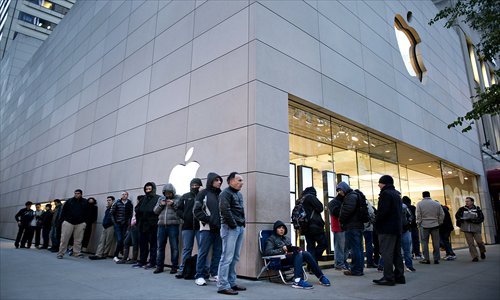Samsung’s muscle versus Apple’s ‘cool’

Its products may not, as one British judge put it, be as "cool" as bitter rival Apple's, but Samsung Electronics is speeding away from the iconic iPhone maker in the race for the global smartphone market.
The South Korean giant first took Apple's smartphone top spot in the third quarter of 2011, racking up a 20 percent slice of worldwide sales compared to Apple's 14.5 percent, according to telecom research firm IDC.
Jump ahead a year to the just-finished third quarter of 2012 and Samsung's share has surged to 31.3 percent, with Apple on 15 percent.
Popular perceptions of the two companies - currently locked in a series of patent infringement lawsuits in 10 countries - could hardly be more different.
Apple is seen as the supreme innovator, single-handedly creating or reinventing entire markets with a small number of imaginative, stylish products that inspire quasi-religious devotion among those who can afford them.
Samsung, by contrast, is the corporate behemoth that picks up ideas, refines them with extraordinary efficiency and packages them in a wide product range that covers both low- and high-end users.
The hysteria that surrounds most Apple launches is testament to the expectations it generates as a product and design pioneer, a role Samsung has never particularly aspired to.
Ironically, Apple's design muscle saw it lose one of its patent fights with Samsung when a British judge ruled in July that Samsung's Galaxy tablet was not "cool" enough to be confused with Apple's iPad.
However, Apple has been forced to adapt in the face of Samsung's rise. On Friday it released the iPad mini - a scaled-down version of its beloved tablet computer - but it failed to generate the same excitement as previous launches.
Apple's late co-founder Steve Jobs had once derided the whole concept of small tablets, saying they should be packaged with sandpaper, "so that the user can sand down their fingers to around one quarter of the present size."
In a reversal, the iPad mini saw Apple following Samsung into a segment the South Korean firm had already entered earlier this year with the 7-inch version of its Galaxy Tab 2.
But in general, Apple has been the pioneer and Samsung has played catch-up. Nevertheless, Samsung has shown itself to be unbeatable when it comes to gathering its vast resources behind a full-frontal assault on new markets.
"The copycat label still sticks to Samsung whether it likes it or not, but there's still a great business in that," said senior IDC research analyst Kevin Restivo.
"Being a fast follower can be a path to number one, and Samsung is a case study for that," Restivo told AFP.
Most analysts point to two key factors behind Samsung's success in the hugely competitive smartphone market: its embrace of Google's Android operating system and its low- to high-end marketing strategy.
By adopting the popular Android platform and concentrating solely on hardware, Samsung was able to leapfrog smartphone companies such as Nokia and Blackberry-maker RIM who stuck with their own operating systems.
"Once it commandeered the Android battleship and got it pointed in the right direction, it made real dents in the opposition," Restivo said.
Its marketing strategy, meanwhile, has been to put up a high-end flagship model - the Samsung Galaxy S series - to challenge the iPhone while pumping out other more affordable models, especially in markets like Brazil and China.
AFP